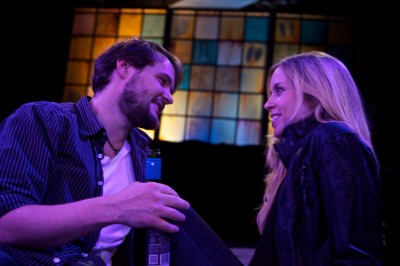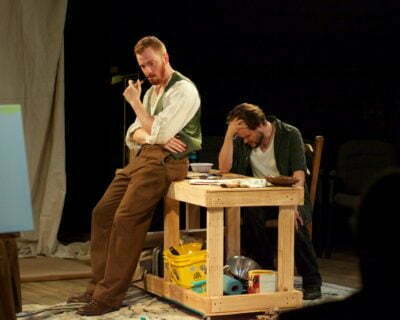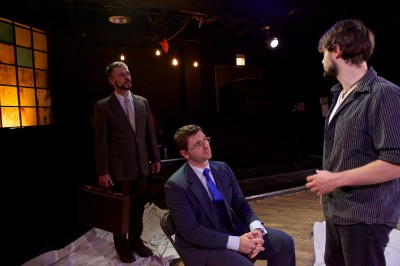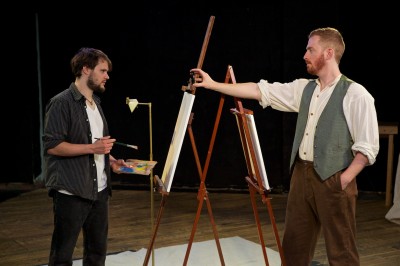Inventing Van Gogh
Directed by Aaron Henrickson
Presented by Strange Bedfellows Theatre
Playing at City Lit Theatre
The Dutch master Vincent Van Gogh—along with his French contemporary Paul Cézanne—led the way in abandoning the strictures of mimetic art. But whereas Cézanne’s indifference to ‘correct drawing’ aimed to create feelings of depth and solidity internal to the painting, it was Van Gogh’s use of a bold and loose brushstroke that finally succeeded in capturing the artist’s own subjective state of frenzied excitement, paving the way for the onslaught of early 20th-century Expressionism.
Few painters before or since have inspired as strong a cult of personality as Van Gogh. The letters he wrote to his brother Theo—which read like a continuous diary—are among the most exhilarating records of the artistic process ever set to paper and led inexorably to a distinctly biographical focus in Van Gogh’s artistic reception.
For his part, Van Gogh’s psychological makeup invites (even insists upon) such a reading. Most likely bipolar, Van Gogh suffered from hallucinations, epileptic fits and wild acts of self-mutilation (including a notorious episode wherein he lopped off his own ear). Poignantly enough, despite the copious amount of his correspondence available to us, there remains so much of Van Gogh’s enigmatic personality that remains hidden in the shadows.
 Attempting to shed light on this mystery is playwright Steven Dietz’s intensely cerebral Inventing Van Gogh, currently being staged by the Strange Bedfellows Theatre. ‘Attempting,’ of course, is the operative word here, for in the end the play raises more questions than it answers.
Attempting to shed light on this mystery is playwright Steven Dietz’s intensely cerebral Inventing Van Gogh, currently being staged by the Strange Bedfellows Theatre. ‘Attempting,’ of course, is the operative word here, for in the end the play raises more questions than it answers.
The production itself—under Aaron Henrickson’s direction—benefits from a couple of superbly realized performances (largely from Sean Thomas and Adam Schulmerich). However, a strong dramaturgical grip is necessary to keep Dietz’s digressively abstract premise from getting out of hand, and it’s not clear that Bedfellows has sufficient enough hold on its subject. Sometimes letting a play speak for itself is a good thing, but on occasion, a production has to work double-time to keep the emotional through lines and character motivations clear. Unfortunately, Dietz doesn’t make either easy.
Despite the play’s evocative title, the central character isn’t the madcap Dutch artist at all, but rather a brooding young painter of our own era named Patrick (Patrick Cameron), a former protégé and devotee of the late Dr. Jonas Miller (Sean Thomas), who was himself an ardent Van Gogh scholar and enthusiast. Miller’s recent ‘suicide’ has raised a few eyebrows, and there lingers the ominous implication that Patrick may be directly involved.
In the play’s opening moments, an art authenticator by the name of Renne Bouchard (Adam Schulmerich) broaches Patrick to forge a supposedly non-existent ‘final self-portrait’ of Van Gogh. Although Patrick is at first reluctant to take the project on, he ultimately succumbs after Bouchard threatens to have the question of Miller’s death reexamined by the authorities. Besides, before his untimely death, Miller was on a Holy Grail-like quest to uncover this alleged portrait, and Patrick thinks its ‘discovery’ may afford an opportunity to patch things up with Miller’s daughter Hallie (Christine Vrem-Ydstie), with whom Patrick once shared a schooldays love affair.
Patrick’s ensuing need to ‘invent Van Gogh,’ as it were, of course invites a dramatic flashback to the life and times of the artist himself (played by  Riley McIlveen), with whom Patrick strikes up a cordial if not fraught personal relationship. Watching from his own historical vantage point, Patrick therein becomes witness to Van Gogh’s own troubled life: his hospitalization under the watch of Dr. Gachet (Sean Thomas), his frustrated love affair with Gachet’s daughter Margurite (Christine Vrem-Ydstie), his inchoate ramblings on the nature of art, and his frequently tense relationship with one-time roommate Paul Gauguin (Adam Schulmerich).
Riley McIlveen), with whom Patrick strikes up a cordial if not fraught personal relationship. Watching from his own historical vantage point, Patrick therein becomes witness to Van Gogh’s own troubled life: his hospitalization under the watch of Dr. Gachet (Sean Thomas), his frustrated love affair with Gachet’s daughter Margurite (Christine Vrem-Ydstie), his inchoate ramblings on the nature of art, and his frequently tense relationship with one-time roommate Paul Gauguin (Adam Schulmerich).
If certain thematic parallels emerge between Van Gogh’s life and Patrick’s, it’s not a coincidence. At its core, Inventing Van Gogh is about the self-reflective capacities innate to all artistic creation, and there’s a certain sophisticated thrill in watching Patrick wade through the mess of Van Gogh’s life for meaning only to find such an act stands to illuminate his own circumstances. Indeed, in his efforts to forge Van Gogh’s self-portrait, Patrick realizes that he has ultimately forged his own. In looking into the face of another, he has found himself. As fitting an homage to the master self-portraitist as one might hope to achieve onstage.
Patrick Cameron makes the most of the role as written, though it’s hard to forge too clear-cut a motivating drive when Dietz has his protagonist in a constant state of passive reception. Patrick’s goals are largely esoteric and barely articulated even to himself, which puts Cameron in the awkard position of being perpetually reactive to the other characters. Always listening, responding, or reacting against, Cameron has an understandably difficult time fully taking the stage, given that Dietz has written so much of the character into the periphery.
 More stridently front and center is Riley McIlveen as the titular Van Gogh. McIlveen captures the artist’s child-like wonder and his excitable energies, though he barrels through Dietz’s wordy speeches with less reflective understanding than we might hope for. Similarly, Christine Vrem-Ydstie’s words have a tendency to get swallowed up when we so desperately need them to be clear. Still, despite a somewhat meek vocal delivery, she had an uncanny ability to suddenly break out with raw fits of emotion that were genuinely moving, especially in her depictions of Gachet’s daughter Margurite.
More stridently front and center is Riley McIlveen as the titular Van Gogh. McIlveen captures the artist’s child-like wonder and his excitable energies, though he barrels through Dietz’s wordy speeches with less reflective understanding than we might hope for. Similarly, Christine Vrem-Ydstie’s words have a tendency to get swallowed up when we so desperately need them to be clear. Still, despite a somewhat meek vocal delivery, she had an uncanny ability to suddenly break out with raw fits of emotion that were genuinely moving, especially in her depictions of Gachet’s daughter Margurite.
Sean Thomas gives an enlivening performance, his enthusiasms—much like those of Dr. Miller’s himself—being remarkably infectious. Thomas, more so than anyone else, aptly conveys the dream-like whimsy of the play, eschewing too strictly a realistic portrayal in favor of something ever-so-slightly exaggerated, larger-than-life and even magical. And Adam Schulmerich demonstrates a considerable range, fluidly transitioning between the effete Bouchard to the gruff Gauguin without a hitch. Exhaustively thorough, Schulmerich is one of those actors who employs all the resources at his disposal—both vocal as well as physical—in crafting subtle portraitures of incredible distinction.
So ultimately despite Inventing Van Gogh’s more obtuse qualities, I’ll venture to say that Strange Bedfellow’s current mounting is still worth the price of admission. At times as wildly out-of-control as Van Gogh himself, there’s nonetheless something intoxicating about its particular brand of madness. Never content to simply tell us what it’s trying to say, the play requires that we actively wade through the muck to find it out. And only even then do we find ourselves reflected back at us. Much like the action internal to the play itself, extracting meaning from Inventing Van Gogh is its own form of self-portraiture.
RECOMMENDED
Reviewed by Anthony Mangini
Reviewed Saturday, August 3rd.
Running time is approximately 2 hours with one intermission.
Inventing Van Gogh runs until August 25th. City Lit Theatre is located at 1020 W. Bryn Mawr Avenue.

